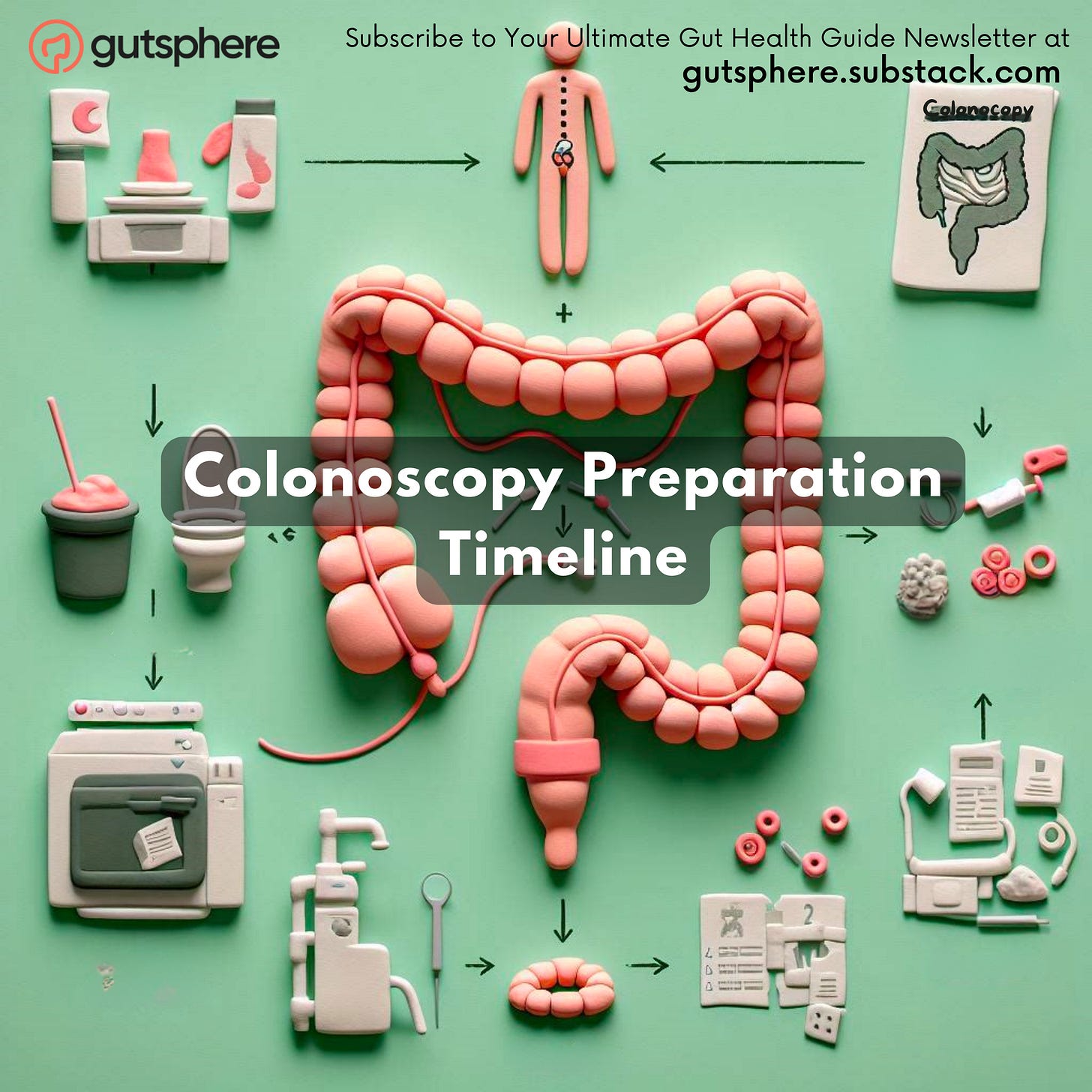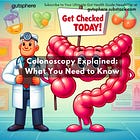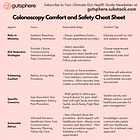Ready, Set, Prep: How to Prepare for a Colonoscopy ( Part 3/10)
Detailed guidance on dietary recommendations, bowel preparation solutions, and what to avoid prior to the procedure.
Previous
Hello, Everyone!
Welcome, dear members of the Gutsphere community, to the third edition of our comprehensive colonoscopy series.
As we gear up for the important day of the colonoscopy, having a clear-cut timeline can help ensure that everything goes smoothly.
Here's a breakdown of what to do (and what not to do) as we prepare:
Colonoscopy Preparation Timeline: A Step-by-Step Guide
One Week Before Your Colonoscopy
Task: Have a detailed chat with your doctor.
Do's:
Ask all the questions you might have.
Clarify any doubts.
Confirm your current list of medications, including any allergies or adverse reactions you’ve experienced.
Don'ts:
Withhold information about your health history or current health status.
Forget to mention any over-the-counter medicines or supplements you're taking.
Five Days Before Your Colonoscopy
Task: Review and adjust your medications if needed.
Do's:
Follow your doctor’s guidance on adjusting your current medications.
Pay special attention to instructions regarding blood thinners or diabetes medications.
Don'ts:
Change your medication regimen without medical advice.
Three Days Before Your Colonoscopy
Task: Start transitioning your diet to low-fiber foods.
Do's:
Begin eating low-fiber options like white bread, rice, and eggs.
Opt for simple, easily digestible meals.
Don'ts:
Consume high-fiber foods such as whole grains, nuts, seeds, or raw fruits and veggies.
The Day Before Your Colonoscopy
Morning to Afternoon Task: Shift entirely to a clear liquid diet.
Do's:
Drink clear broths, teas, and clear juices.
Keep yourself hydrated with electrolyte solutions if necessary.
Don'ts:
Eat any solid foods or dairy products.
Drink any liquid that you can't see through, such as milk or orange juice.
Afternoon Task (6 Hours Before Bedtime): Begin your bowel prep regimen.
Do's:
Start the bowel prep according to the schedule provided by your doctor.
Don'ts:
Drink only a portion of the solution. It's essential to complete the full prescribed amount for a thorough cleanse.
Evening Task: Finish the bowel prep solution.
Do's:
Continue drinking the solution and stay near a restroom.
Don'ts:
Ignore the need to go to the bathroom when the urge arises.
Day of the Procedure
Task (6 Hours Before Appointment): Fast completely.
Do's:
Abstain from all liquids to ensure an empty stomach for sedation.
Don'ts:
Drink anything, including water, gum, or mints.
Arrival at the Clinic
Task: Begin your procedural preparations.
Do's:
Change into the provided gown.
Get an IV started if needed.
Address any last-minute questions with your nurse.
Don'ts:
Hesitate to share any anxieties or concerns you may have.
During the Procedure
Task: Sedation and examination.
Do's:
Trust the healthcare team and let the sedation ease you into a comfortable state.
Rest assured that the procedure is conducted with utmost care for your health.
Don'ts:
Resist the sedation, as it's administered for your comfort.
Worry about the procedure, as you will be under careful observation and in skilled hands.
Immediately After
Task: Recovery period.
Do's:
Allow yourself time to wake up fully.
Start rehydrating with sips of water or a clear drink once you're ready.
Don'ts:
Rush to get up or leave. It's normal to feel groggy after sedation.
Leaving the Clinic
Task: Review the doctor's initial feedback.
Do's:
Listen carefully to any feedback given by your doctor.
Confirm that your arranged ride is ready to take you home.
Don'ts:
Dismiss the advice or instructions provided post-procedure.
The Next Day
Task: Resume your normal diet.
Do's:
Start with light meals and gradually reintroduce solid foods.
Don'ts:
Jump immediately into consuming heavy, spicy, or rich foods. Allow your digestive system to ease back into its regular routine.
Follow-Up
Task: Awaiting results and next steps.
Do's:
Stay alert for any follow-up communication from your doctor’s office.
Don'ts:
Neglect post-procedure appointments or communications from your healthcare team.
Did You Know? The Impact of Inadequate Preparation on Colonoscopy Efficacy
The Silent Issue in Colorectal Screening
In the world of gastrointestinal health, colonoscopies are a cornerstone procedure. However, a silent issue often undermines their efficacy: inadequate preparation. A startling number of colonoscopies fail to serve their purpose effectively due to this very reason.
The Statistics Tell a Story
Studies reveal that a significant percentage of colonoscopies cannot be completed as intended because patients do not properly prepare. Estimates suggest that approximately 20-25% of all colonoscopies are compromised due to inadequate bowel preparation. This not only hampers the ability to detect potentially life-threatening conditions but also leads to repeat procedures, increasing healthcare costs and patient discomfort.
Understanding the Causes
1. Inadequate Bowel Preparation: The Clearing Hurdle
Description: The path to a clear colon is often obstructed by patients not following the prep instructions correctly, not completing the entire solution, or misinterpreting dietary restrictions.
Patient's Role: It's essential to follow bowel prep instructions meticulously, finish the entire prep solution, and stick to the dietary guidelines provided.
Provider's Role: Healthcare providers must offer clear, simple instructions for bowel prep and provide timely reminders. The key is in communication clarity and support systems like reminder calls or texts.
2. Anxiety or Fear: The Emotional Barrier
Description: Apprehension arises from anticipated discomfort, fear of potential diagnoses, or previous traumatic medical experiences.
Patient's Role: Openly express any fears or anxieties to your healthcare team and seek comprehensive information to understand the procedure better.
Provider's Role: Providers have the responsibility to offer reassurance, thoroughly explain the procedure, discuss sedation options, and provide informative resources.
3. Health Issues: The Physical Impediments
Description: Acute or chronic health conditions, including flu or gastrointestinal issues, can disrupt the prep process or the colonoscopy itself.
Patient's Role: Inform your healthcare provider about any health conditions that could affect the procedure.
Provider's Role: Providers should review medical history in detail, adjust the procedure if necessary, and coordinate with other health services when required.
4. Medication Confusion: The Chemical Conundrum
Description: Questions about how to manage medications, especially those like blood thinners or diabetes medications, can complicate prep.
Patient's Role: Discuss all medications with your doctor well before the procedure to understand how to manage them.
Provider's Role: Medical professionals must give precise instructions on handling regular medications in relation to the colonoscopy.
5. Logistical Challenges: The Planning Puzzle
Description: Coordinating transportation, especially considering the effects of sedation, and reconciling the procedure with personal schedules can be challenging.
Patient's Role: Plan ahead for transportation, inform your work or family, and make the necessary schedule adjustments.
Provider's Role: Schedule procedures at times that minimize disruption to patients' lives, offer reminders, and help with transportation if needed.
6. Lack of Support: The Companion Gap
Description: The absence of a companion for post-procedure care or discomfort discussing the procedure can deter patients.
Patient's Role: Reach out for support from your social circle or discuss any concerns with the healthcare team.
Provider's Role: Encourage bringing a friend or family member for support and emphasize the confidentiality and dignity maintained during the procedure.
7. Financial Concerns: The Economic Obstacle
Description: The cost of the procedure and uncertainty about insurance coverage or out-of-pocket expenses can cause anxiety.
Patient's Role: Ask about procedure costs, insurance details, and financial assistance programs in advance.
Provider's Role: Providers should offer clear information about costs and assist patients with insurance and financial aid options.
8. Lack of Information or Misunderstanding: The Knowledge Deficit
Description: A fundamental lack of understanding of the procedure's importance or prevailing myths can lead to undervaluation of the colonoscopy.
Patient's Role: Seek information to fully grasp the significance of the procedure and its role in preventive health.
Provider's Role: It is incumbent upon healthcare providers to supply educational materials, address questions, and correct any misinformation.
Wrapping Up Edition 3: Stepping Stones to Successful Screening
As we wrap up this edition, remember that each step in our prep is a step toward safeguarding your health. Our commitment to following these guidelines is key to a clear and effective colonoscopy.
Next
Request
Share
Our sincere request to you is to share the newsletter with your friends, family, and community so that they can benefit from the content. Also it will help us grow the newsletter, and eventually, as we release more content, digital tools, and more we will enable people around the world to live chronic disease free.
Subscribe
Feedback
Also, please give us feedback so that we can improve the content. And if there are any topics that you want us to cover please send us your questions and topics. Furthermore, if you try any of the things we provided information please share your experience with us.
Thank You
GutSphere Team
Disclaimer
Please note that the information provided in this newsletter is for informational purposes only and should not be considered as a substitute for professional medical advice, diagnosis, or treatment. If you have any concerns or questions about our health, please consult with a licensed healthcare professional. The information contained in this newsletter is not intended to diagnose, treat, cure, or prevent any disease. The publisher and authors of this newsletter assume no responsibility for any adverse effects that may result from the use of the information contained herein.





